Section 3: LITHUANIA TODAY
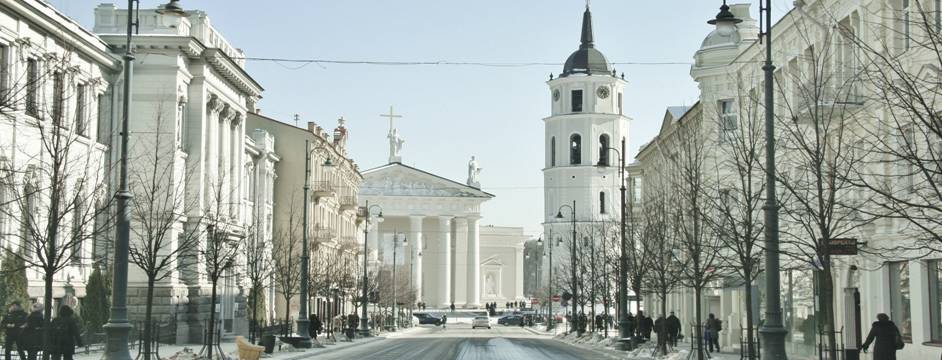

THE VOICE OF INTERNATIONAL LITHUANIA
|
VilNews has its own Google archive! Type a word in the above search box to find any article.
You can also follow us on Facebook. We have two different pages. Click to open and join.
|
Sat, 4th August, 2012 - (0) Comment

Kestutis Eidukonis tells us in this story about his experiences on what you have to expect when you travel out of Vilnius to experience the Lithuanian countryside…
As a frequent visitor to Lithuania, I find an interesting disconnect from beautiful Vilnius and the rest of the countryside - I do not mean Kaunas or the rest of the major cities, but the real countryside where the rest of the Lithuania lives, works and fights their daily fight with bureaucracy and the legacy of Homo Sovieticus.
In Vilnius, you have the beauty of Old Town (Senamiestis) Pilies street and all that that entails. Sure there is the occasional fight with the beggars, the graffiti and the out of control druggie or local character of interest such as Grafas or Rozyte. In the "Kaimas" however you are dealing with people who take every occasion to get drunk, who are set in the old ways. The un mown grass, the flies, the mosquitoes, the bad roads, the problem of getting anything fixed. The lack of motivation of some of the locals. The negative attitudes towards city folks and the government. Try to get a plumber or electrician to drive 40 kilometers to fix anything. All these problems however pale in comparison to the biggest battle that lies ahead for anyone who plans to farm or work on reforestation.
Sat, 28th July, 2012 - (0) Comment
Thu, 26th July, 2012 - (0) Comment

THURSDAY 26 JULY 2012: Pilies Street, the vibrant, active pedestrian street
in the heart of Vilnius Old Town. You should come here to enjoy
Northern Europe's best summer climate. Why wait?
There are still many around the world not knowing what a wonderful summer climate Lithuania is blessed with. I myself was very surprised when I came here 20 years ago and found a country and a city, Vilnius, where temperatures and number of sunny summer days often are comparable to what you otherwise would have to travel much closer to the Mediterranean beaches to find.
What I also have seen during these 20 years is that while many neighbouring countries quite often suffer from either drought or floods, Lithuania normally avoids such disasters. We can have heavy showers, but they usually last only a few hours and rarely cause major damage. We can have temperatures up to 35 degrees Celsius (95 Fahrenheit), but the normal temperature level is within comfortable 22-30°C (72-86°F).
Right now the summer is just great here, although this year we have not had as much sunshine and as high temperatures as we are accustomed to. Forecasts for the rest of July, however, are phenomenal!
The great summer weather is in stark contrast to neighbouring countries in Scandinavia and north western Europe where one this year is experiencing one of the coldest and wettest summers ever. The powerful winds and the worst rain showers from the Atlantic Ocean have virtually lost all power before they come here.
Hurricanes and severe storms are, at worst, a slight breeze on those few occasions when they reach Lithuania. Rain storms are reduced to light drizzle when they arrive here. But usually the bad weathers do not reach as far east as hereto.
Unfortunately, the winter months here are not that excellent. They can often be cold, nasty and very gloomy. Fortunately, we rarely experience heavy winds, and it is usually not too much snow. The worst of the winters here is the gloominess, and that the temperatures may well drop down to minus 25-30°C (minus 13-22°F).for extended periods.
But it often happens that in April the summer arrives in full force and remains here until November. So now we are in the middle of the fantastic weather period. No reason to complain, in other words. Winter is many months away.
Now it's time to enjoy the lovely summer here. The best in Northern Europe!
Aage Myhre
Sat, 14th July, 2012 - (3) Comment
All week we have been having scattered thunderstorms in Lithuania. Thursday 12 July we had a storm come through late afternoon that dropped “a little” rain on Old Town.
Rather than tell you about it I thought it would be better to show you what Pilies Gatve looked like after this “little shower”.
For a rough translation of the title and comment:
Das ist lietus in Vilnius / 2012 07 12 pilies gatves upe (This seems to be half German and Half Lithuanian) - This is rain in Vilnius 12 July 2012. Pilies Gatve river
2012 liepos 12 pilies gatve plauke kedes ir stalai. Katinu nebuvo. O pati liutis buvo idomi. Pasirodo tos kedes ir stalai buvo cili picos nuosavybe. Ha! – 12 July 2012 on Pilies Gatvė swam chairs and tables. Cats were not there. And (the) rain was interesting. It appears that (the) chairs and tables were (the) property of Čili Pizzeria. Ha!
Wed, 11th July, 2012 - (0) Comment

Zagare Cherry Festival – a traditional event which helps to develop Northern Lithuania, former Semigallian territory, culture, unique and attractive image of Zagare as one of the oldest towns in Lithuania and beautiful tourism destination, promoting the development of this the former Northern Lithuanian cultural center of the eighteenth century. Cherry Festival and Zagare is an inexhaustible storehouse of knowledge, new impressions and events. Culturally crossing a couple of centuries of Zagare history, the eighth Cherry Festival will help to discover, explore and understand the uniqueness of the town. The main event of the festival, using historical materials and staged events of the past, will raise from oblivion the image of the historical market square. Although the present town and the town of those old separates only 200 years time, these "cultural centers" in Cherry Festival will be closer together than ever before. The time machine and all the characters will carry away to the past where the ancient craftsmen is working, merchants schooling, costumed waiters invite for dinner, the bagpipe and an old gramophone begin to play, still managed to play the older version of the melody than itself, which touched both young and old hearts...
Wed, 4th July, 2012 - (1) Comment

Andy Hernandez after the mafia attack last Friday.
My friend, Filipino Andy Hernandez, a veteran Newsweek war photographer who now lives in Lithuania, where he, among other things, makes his living by owning and operating a handful of restaurants, was brutally beaten in one of his own restaurants last Friday.
The attack on Andy and his wife appears to be racially motivated, and unfortunately, racism is a very, very serious problem in present day Lithuania.
It seems, also, as if the recession has provided various mafia groups more room and more power. Smuggling and production of drugs, human trafficking, prostitution and other things with a basis in Lithuanian mafia groups is an increasingly serious problem for Europe.
The assault on Andy and his wife is only the tip of an iceberg that is growing ever greater.
Wed, 4th July, 2012 - (0) Comment
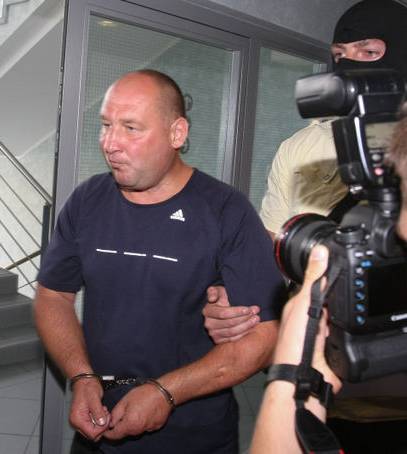
A Vilnius court on Tuesday sanctioned arrest of Stanislovas Narkevičius,
who is suspected of having assaulted a Filipino businessman in the town
of Trakai, 30 km from Vilnius. The man was arrested for two weeks.
"15 Minutes" photo. / Stanislav Narkevicius
Airinė Šerelytė, the court spokeswoman, confirmed to Baltic News Service (BNS) that the court had sanctioned arrest of Stanislovas Narkevičius, aka Narkuša.
Prosecutors had asked the court to arrest Narkevičius for three months.
On Monday, prosecutors launched an investigation into the assault of Andy Hernandez, 54, and his wife, 39. Hernandez owns a café in Trakai and his wife works as director there.
The incident took place at around 9:30 PM on Friday. A group of men entered the café and assaulted Hernandez and his wife. They were later both taken to hospital.
Narkevičius was detained for affray on Sunday. He faces up to two years in prison.
Žana Sokolovska, a prosecutor in charge of the investigation, told BNS there might be more suspects in this case.
Hernandez filmed the assault with his mobile phone and the video was published online. It shows one of the assailants cursing the café's staff.
Wed, 4th July, 2012 - (0) Comment
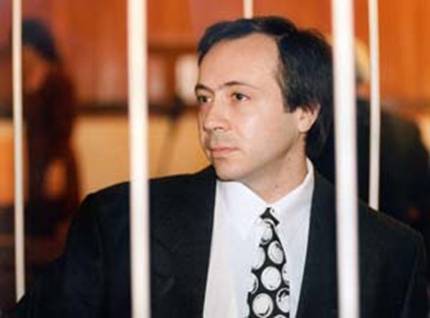
Boris Dekanidze, head of the "Vilnius Brigade", the last person executed by
Lithuania prior to its abolition of the death penalty in 1998.
Boris Dekanidze was the head of the "Vilnius Brigade" organized crime gang in Lithuania. In 1994, he was convicted of ordering the murder of a journalist and was executed. Dekanidze was the last person executed by Lithuania prior to its abolition of the death penalty in 1998.
Dekanidze was born in Lithuania to Georgian Jewish immigrants. He was a stateless person, not having been granted citizenship in Lithuania or Georgia. In Vilnius, he was a leader of the Vilnius Brigade mafia group.
In 1993, after receiving a number of death threats, Vitas Lingys, one of the founders and publishers of the newspaper Respublika, was shot at point-blank range near his home in Vilnius. Dekanidze was arrested and charged with ordering the murder, which police said was carried out by another mafia guy, Igor Akhremov.
In a 1994 trial, Dekanidze was convicted of deliberate murder by a three-judge panel. Dakanidze claimed he was innocent, and the evidence against him was primarily the testimony of Akhremov, who claimed to have carryied out the killing on Dekanidze's orders. On 10 November 1994, Dekanidze was sentenced to death and Akhremov was sentenced to life imprisonment.
Lithuanian authorities shut down the Ignalina nuclear power plant after a terrorist threat was made against it the day after the convictions were handed down. Dekanidze appealed the decision to the Supreme Court, but it ruled in February 1995 that there were no grounds for reviewing the death sentence. His appeal for clemency to President Algirdas Brazauskas was also refused.
Dekanidze was executed on 12 July 1995 in Vilnius by a single shot to the back of his head. The execution has been criticised at being carried out even as the Lithuanian parliament was debating abolition of the death penalty.
No one has been executed by Lithuania since Dekanidze's death. Lithuania abolished the death penalty for all crimes in 1998 after the Lithuanian Constitutional Court ruled that the death penalty was unconstitutional.
Wed, 4th July, 2012 - (0) Comment
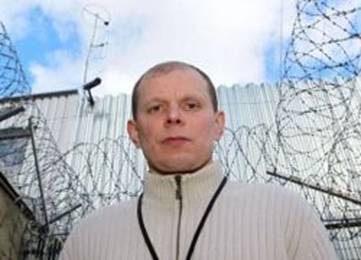
Igor Akhremov.
Igor Akhremov, a member of the criminal gang Vilnius Brigade who killed journalist Vitas Lingys in 1994 was released on parole in April this year.
Vilnius Regional Court overturned the ruling of Vilnius Third District Court and upheld Akhremov's appeal. On 2 March Vilnius Third District Court had rejected the offer of Vilnius Correction House to release Akhremov on parole. The Court said that upon his release the principle of justice would not be achieved as he serves for three extremely dangerous activities.
While Vilnius Regional Court satisfied the appeal describing him as a friendly and polite person, known for good behaviour in prison. Akhremov was assigned to the lowest risk group. The ruling of Vilnius Regional Court is final, not subject to appeal and comes into force immediately. In 1994, Akhremov was convicted for murdering journalist Lingys of the daily Respublika on 12 October 1993.
Boris Dekanidze, the then leader of the criminal gang Vilnius Brigade, who ordered the murder, was sentenced to capital punishment. At first, the court sentenced Akhremov to life imprisonment, but later the Supreme Court reduced the sentence to 25 years of imprisonment. His term of punishment was to expire in autumn 2018.
Sat, 23rd June, 2012 - (11) Comment
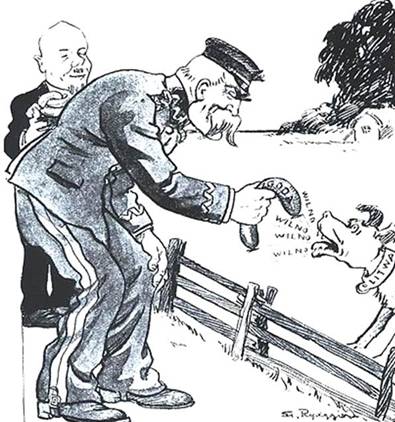
A satirical picture from interwar Polish press (around 1925-1935): a caricature of Marshal Józef Piłsudski and Lithuania, criticizing Lithuanian unwillingness to compromise over Vilnius region. Marshal Piłsudski offers the sausage labeled "agreement" to the dog (with the collar labeled Lithuania); the dog barking
"Wilno, wilno, wilno" replies: "Even if you were to give me Wilno, I would
bark for Grodno and Białystok, because this is who I am."
The tension will continue, until Poland will treat Lithuania
again as a sovereign and independent country
Opnion: Algimantas Gureckas
During the interwar period between First and Second World Wars the political leadership of reconstituted Poland aspired to a European great power status and conducted a policy of territorial expansion against its neighboring countries. As a result of several military campaigns in 1919-1920, Poland acquired considerable territories inhabited by non-Polish populations [see our VilNews articles on the Polish/Lithuanian war 1919-1920 at https://vilnews.com/?p=11551].
In Yalta and Potsdam conferences of 1945, the leaders of the victorious powers, United States of America, Great Britain, and the Soviet Union, established post-war borders of the Polish Republic. They endorsed the 1920 Curzon Line as its eastern frontier (1). This detached Western Ukraine, Western Belarus (2), and Vilnius region from Poland. In order to compensate Poland for the loss of these extensive, albeit mostly non-Polish territories, they assigned to it highly developed German territories of southern East Prussia, eastern Pomerania, Neumark, and Silesia (3). The victorious powers also autorized the expulsion of the entire German population from these territories(4).
The Polish people accepted the German lands as their due compensation for their suffering under the harsh German occupation during the war, but they regarded the loss of the eastern borderlands ("Kresy") as unjust detachment of territories lawfully belonging to the Polish state. However, Polish political leadership, the ruling communist regime, as well as the democratic underground, realized that any Polish claims to the lost territories in the East would undermine the Polish title to the newly acquired valuable lands in the West. Thus, eventually the view promoted by Jerzy Giedroyc, editor of an influential journal Kultura, and his collaborator Juliusz Mieroszewski prevailedthat Polish nation and state should sincerely renounce any claims to the interwar eastern territories.
Sat, 23rd June, 2012 - (0) Comment
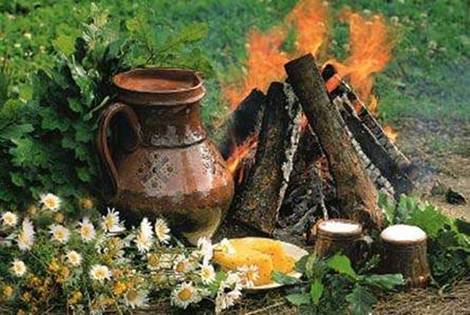
The holiday, in fact, is not the Midsummer Day, June 24, but the evening and night preceding it. The holiday coincides with the summer solstice. At the beginning of the 20th century it was observed all over Lithuania, now it is more popular in the northern and central parts of the country. Although St. John the Baptist occupies a very important place in the hierarchy of saints, the Church does not attach any great importance to the celebration of his nativity, which falls on the Midsummer Day. It is a festival of simple people, connected with the veneration of fire. Young girls adorn their heads with flower wreaths. A tall pole with a wooden wheel soaked in tar or filled with birch bark is hoisted at the top of the highest hill in the vicinity. Men whose names are Jonas (John) set the wheels on fire and make bonfires around it. In some places a second pole is hoisted with flowers and herbs. Young people dance round the fire, sing songs about rye, play games, men try to jump over the fire. The burning wheels on the poles are rolled down the hill into a river or a lake at its foot, men jumping over it all along. On the Midsummer Day people weed the rye and burn all the weeds.
On Midsummer Day's morning witches acquire special powers, they drag towels over the dewy grass to affect cows' milk. To save their cows from the witches' magic farmers shut them in cowsheds for the Midsummer Night and stick bunches of nettle in the door to scare the witches away. On Midsummer Day cows are driven out to pasture in the early after- noon when there is no more dew on the grass. Horses, however, are left to graze in the open throughout the night, or the witches magic has no effect on them.
On Midsummer Day dew has special healing powers. Young girls wash their faces in it to make themselves beautiful, older people do the same to make themselves younger. It is good to walk barefoot in dew on Midsummer Day's morning, for it saves the skin from getting chapped.
Thu, 31st May, 2012 - (0) Comment

The new generations are leaving the country in droves and very few from the country's diaspora groups plan to come home to contribute to the reconstruction of this once fine and proud country.
Our series of articles through April and May has revealed enormous discrepancies between Lithuania's current leadership and the large group of Lithuanians living outside their homeland.
It is assumed that the country's best educated and economically active segment of the population now lives in Western Europe, the USA and sometimes other countries, but that today's leaders do not do much to reach out to them, start the kind of communication that is necessary to get this country on its feet again.
Obviously, this is tragic. All Lithuanians love their homeland, but feel that the government and the leadership generally do little to facilitate for the country to grow healthy and successful.
Meanwhile, the young, non corrupt professionals are very reluctant to assume political office. "We do not want to stick your hand into this overgrown wasp's nest," we have heard several say. The result is that the new generations are leaving the country in droves and that very few from the country's diaspora groups plan to come home to contribute to the reconstruction of this once fine and proud country.
We proposed a few days ago that Lithuanians outside their home country should start coming back home to contribute to new growth and better living conditions here. These are some of the responses we have recorded.
----------------------------------------------------------------------------------------------------------------------

Viktorija Ruškulienė
Once only corrupt government and retired elderly are left, Lithuania's economy will reach the very bottom and push itself up
Once only corrupt government and retired elderly are left, Lithuania's economy will reach the very bottom and push itself up: things will start to change, hopefully for the better. As there will be no one to be robbed, the ex-KGB-today-"democratically"-elected-mob-government will follow the path of their foreign invested funds and retire outside of Lithuania. Hopefully there still will be some Lithuanians willing to return back to their homeland...
Some more realistic politicians suggest to open Lithuanian job market for Belarus young professionals and political refugees, with a promise of European citizenship after 7 years working and paying taxes in Lithuania. This will become some "injection" to keep economy floating at the level it is today, but what will happen if Belarus elects new government and joins EU? Will people from Asia's developing countries be interested in cold climate and hopeless economy refuge?
Lithuania loves money, sent by expatriates, though...
----------------------------------------------------------------------------------------------------------------------

Grant Gochin
Lithuania does NOT love the expatriate community. If the country of Lithuania rejects us, why maintain our Lithuanian identity?
Lithuania does NOT love the expatriate community. Rather, LT does EVERYTHING possible to reject them. Loyalty has to work both ways. The days of the state being a slave-master and the citizens being mindless obedient drones are over.
If the country of Lithuania rejects us, why maintain our Lithuanian identity?
The people have to protest. If nobody does, nothing will improve.
Mon, 28th May, 2012 - (3) Comment
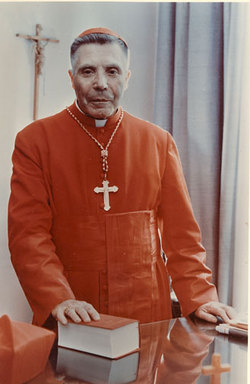
Vincentas Sladkevičius, MIC
(August 20, 1920—May 28, 2000)
Vincentas Sladkevičius, MIC (August 20, 1920—May 28, 2000) was a Lithuanian Cardinal of the Roman Catholic Church. He served as Archbishop of Kaunas from 1989 to 1996, and was elevated to the cardinalate in 1988.
Vincentas Sladkevičius was born in Žasliai, Kaišiadorys, to Mykolas Sladkevičius and his wife Uršule Kavaliauskaite. He was the youngest of five children, his siblings being named Ona, Emilija, Jonas and Marija. After studying at the Kaunas Priest Seminary and Theological Faculty in Kaunas, Sladkevičius was ordained to the priesthood on March 25, 1944. He then did pastoral work in Kaišiadorys until 1959, including serving as a professor and the prefect of studies and discipline at the Kaunas seminary.
On November 14, 1957, Sladkevičius was appointed Auxiliary Bishop sedi datus of Kaišiadorys and Titular Bishop of Abora. He received his episcopal consecration on the following December 25 from Bishop Teofilius Matulionis. However, Bishop Sladkevičius was impeded from performing his ministry by his country's Communist government, and he took up residence at Nemunėlio Radviliškis, where he was under virtual house arrest from 1963 to 1982. He was named Apostolic Administrator ad nutum Sanctae Sedis of Kaišiadorys on July 15, 1982, and became President of the Lithuanian Episcopal Conference on April 27, 1988.
Pope John Paul II created Sladkevičius Cardinal Priest of Spirito Santo alla Ferratella in the consistory of June 28, 1988, and later Archbishop of Kaunas on March 10, 1989. In 1993 the Cardinal entered the Congregation of the Marian Clerics of the Immaculate Conception. He resigned as Kaunas' archbishop on May 4, 1996, after seven years of service. He was awarded the Order of Vytautas the Great in 1998.
V. Sladkevičius died in Kaunas, at age 79. He was buried in the Cathedral-Basilica of Kaunas following a funeral Mass there on June 1, 2000.

An article by KR Slade
Wed, 23rd May, 2012 - (0) Comment
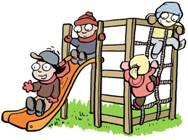

Wed, 9th May, 2012 - (6) Comment

Dear Mayor Zuokas,
I live in the Vilnius old town with my wife and young child. We have a small family business and are very happy here. Yet, one thing that concerns us very much is the lack of quality, safe play areas for young children in Vilnius old town. Within the old town there are basically three playgrounds:
Sereikiškės Park: There used to be two play areas. But one was in very bad condition and was removed. The play area which remains is currently the best in the area. But in nice weather it is generally completely full of children.
Vilniaus Gatve: Last year a small wooden park was built near the Šv. Kotrynos Church. It is very simple wooden play area and already needs repairs.
Vokieciu Gatve (behind the Post Office): This is a rundown, playground in very bad condition. It is a night time hangout for drunks and is always full of trash, broken bottles and animal droppings.
As you know, the children of the old town have very few options to walk to recreation, get exercise and breathe fresh air. I was excited to learn recently that you have decided to improve and build several new parks in Vilnius!
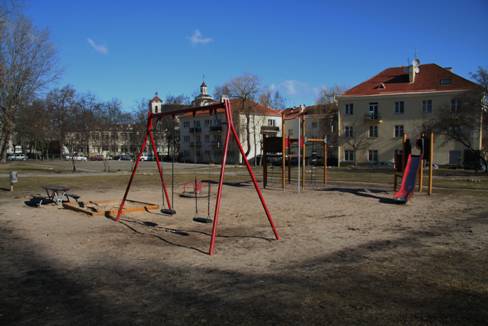
Vokieciu Gatve (behind the Post Office): This is a rundown, playground in very bad condition. It is a night time hangout for drunks and is always full of trash, broken bottles and animal droppings.

These waste containers are located just 50 meters from the playground at Vokieciu g.. They are a favorite haunt for the homeless and others in search of food residues.
Sun, 6th May, 2012 - (3) Comment

Impression from my today’s visit to the Jurbarkas Cemetery.
Text/photos: Aage Myhre
aage.myhre@Vilnews.com
I was up very early today, to drive the 200 kilometers (125 mi.) to Jurbarkas town, where mothers and grandmothers of my wife's family are buried.
A sunny day, a fantastic backdrop for the celebration and commemoration to the honour of these proud Lithuanian women.
You are cordially invited to join the tour and see the pictures I took in this incredibly beautiful cemetery ...
VilNews e-magazine is published in Vilnius, Lithuania. Editor-in-Chief: Mr. Aage Myhre. Inquires to the editors: editor@VilNews.com.
Code of Ethics: See Section 2 – about VilNews. VilNews is not responsible for content on external links/web pages.
HOW TO ADVERTISE IN VILNEWS.
All content is copyrighted © 2011. UAB ‘VilNews’.